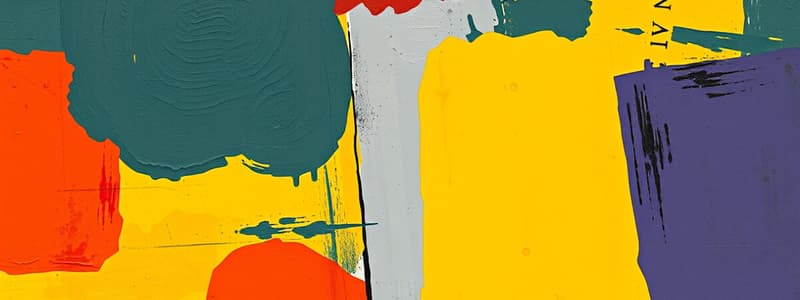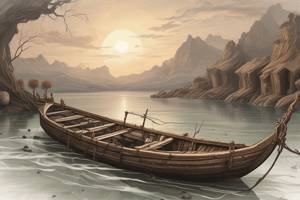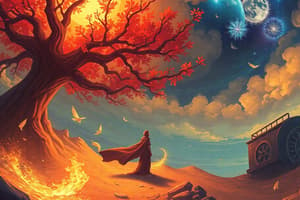Podcast
Questions and Answers
What are the unique features of poetry?
What are the unique features of poetry?
Imaginative awareness of experience, expressive language, use of meter and rhyme.
What are the four conventional literary genres?
What are the four conventional literary genres?
Poetry, Drama, Fiction, Non-Fiction.
What is Drama characterized by?
What is Drama characterized by?
Composition in prose or verse presenting a story in dialogue or pantomime.
What is Non-Fiction based on?
What is Non-Fiction based on?
What defines Fiction?
What defines Fiction?
Which of the following is an example of an illustrated novel?
Which of the following is an example of an illustrated novel?
What genre does Digi-fiction combine?
What genre does Digi-fiction combine?
What does a Graphic Novel convey?
What does a Graphic Novel convey?
Define Manga.
Define Manga.
What is Doodle Fiction?
What is Doodle Fiction?
What is the main characteristic of Text-Talk Novels?
What is the main characteristic of Text-Talk Novels?
What issues does Chick Lit typically address?
What issues does Chick Lit typically address?
What defines Flash Fiction?
What defines Flash Fiction?
Who is often credited with creating a famous six-word flash fiction?
Who is often credited with creating a famous six-word flash fiction?
What does Creative Non-Fiction use to create narratives?
What does Creative Non-Fiction use to create narratives?
Which of these is an example of Creative Non-Fiction?
Which of these is an example of Creative Non-Fiction?
What is the main theme of Science Fiction?
What is the main theme of Science Fiction?
Flashcards are hidden until you start studying
Study Notes
Conventional Literary Genres
- Poetry: Expresses imaginative awareness through careful language choices to evoke emotions. Usually employs meter and rhyme. Difficult to define due to its subjective nature.
- Drama: A narrative in prose or verse that presents a story involving dialogue, conflict, and character contrast, designed for stage performance.
- Fiction: Literature stemming from imagination rather than fact, encompassing novels, short stories, and novellas.
- Non-Fiction: Based on factual information and the author's perspective, aiming to inform or persuade. Examples include biographies and journalistic articles.
21st Century Literature Genres
- Illustrated Novel: Combines text with illustrations, creating a narrative where 50% is communicated visually. Readers interpret images for full story comprehension. Examples include The Invention of Hugo Cabret and The Arrival.
- Digi-Fiction: Integrates three media formats—book, video, and website. Full understanding requires navigation, reading, and viewing. Examples are Skeleton Creek and Level 26.
- Graphic Novel: Presents narratives in a comic book format, encompassing both fiction and non-fiction. Example: Archie Comics.
- Manga: Japanese comics, comprising various genres targeting different demographics (Shonen, Shojo, Seinen, Josei, Kodomo). Known for distinct artistic and storytelling styles.
- Doodle Fiction: Features doodles, handwritten elements, and drawings instead of traditional fonts, often adding humor. Examples include The Diary of a Wimpy Kid and Timmy Failure.
- Text-Talk Novels: Stories told in formats resembling blogs, emails, or instant messaging, focusing heavily on dialogue.
- Chick Lit: Genre focused on modern womanhood with a light-hearted tone. Protagonists often reflect femininity. Examples: The Night Before Christmas by Scarlet Bailey, It Started With a Kiss by Miranda Dickinson.
- Flash Fiction: Extremely brief fictional literature without a standardized length, ranging from single words to a thousand words.
- Six-Word Flash Fiction: A concise storytelling style exemplified by Hemingway’s “For sale: baby socks, never worn.”
- Creative Non-Fiction: Uses literary techniques to create accurate narratives, differing from traditional non-fiction styles like journalism. Examples include 1000 Gifts by Ann Voskamp and Wind, Sand, and Stars by Antoine de Saint-Exupery.
- Science Fiction: Explores imaginative themes like futuristic science, technology, space travel, and extra-terrestrial life, often examining societal impacts and possibilities.
Studying That Suits You
Use AI to generate personalized quizzes and flashcards to suit your learning preferences.



